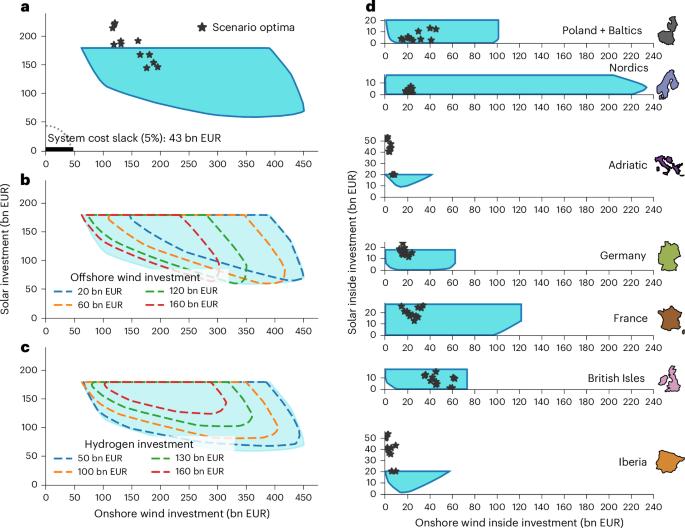Trading off regional and overall energy system design flexibility in the net-zero transition
IF 27.1
1区 环境科学与生态学
Q1 ENVIRONMENTAL SCIENCES
引用次数: 0
Abstract
The transition to net-zero emissions in Europe is determined by a patchwork of country-level and European Union-wide policy, creating coordination challenges in an interconnected system. Here we use an optimization model to map out near-optimal energy system designs for 2050, focusing on the planning flexibility of individual regions while maintaining overall system robustness against different weather years, cost assumptions and land-use limitations. Our results reveal extensive flexibility at a regional level, where only few technologies (solar around the Adriatic and wind on the British Isles and in Germany) cannot be substituted. National policymakers can influence renewable energy export and hydrogen strategies significantly, provided they coordinate this with the remaining European system. However, stronger commitment to solar in southern Europe and Germany unlocks more design options for Europe overall. These results on regional trade-offs facilitate more meaningful policy discussions that are crucial in the transition to a sustainable energy system. Transitioning to a net-zero future requires several energy-related interventions by a variety of actors across scales. Modelling results now show that, considering critical trade-offs and uncertainties, there is significant spatial flexibility in how the European energy system can be designed to achieve carbon neutrality.

在净零转型中权衡区域和整体能源系统设计的灵活性
欧洲向净零排放的过渡是由国家层面和欧盟范围内的政策拼凑而成的,这在一个相互关联的系统中创造了协调挑战。在此,我们使用一个优化模型来绘制2050年的接近最优的能源系统设计,重点关注单个区域的规划灵活性,同时保持整体系统对不同天气年,成本假设和土地利用限制的鲁棒性。我们的研究结果显示了在区域层面上的广泛灵活性,只有少数技术(亚得里亚海周围的太阳能和不列颠群岛和德国的风能)不能被取代。国家政策制定者可以显著影响可再生能源出口和氢战略,前提是他们与剩余的欧洲体系进行协调。然而,南欧和德国对太阳能的更坚定承诺为整个欧洲带来了更多的设计选择。这些关于区域权衡的结果促进了对向可持续能源系统过渡至关重要的更有意义的政策讨论。向净零排放的未来过渡,需要不同规模的各方采取与能源相关的干预措施。现在的建模结果表明,考虑到关键的权衡和不确定性,在如何设计欧洲能源系统以实现碳中和方面存在显著的空间灵活性。
本文章由计算机程序翻译,如有差异,请以英文原文为准。
求助全文
约1分钟内获得全文
求助全文
来源期刊

Nature Sustainability
Energy-Renewable Energy, Sustainability and the Environment
CiteScore
41.90
自引率
1.10%
发文量
159
期刊介绍:
Nature Sustainability aims to facilitate cross-disciplinary dialogues and bring together research fields that contribute to understanding how we organize our lives in a finite world and the impacts of our actions.
Nature Sustainability will not only publish fundamental research but also significant investigations into policies and solutions for ensuring human well-being now and in the future.Its ultimate goal is to address the greatest challenges of our time.
 求助内容:
求助内容: 应助结果提醒方式:
应助结果提醒方式:


